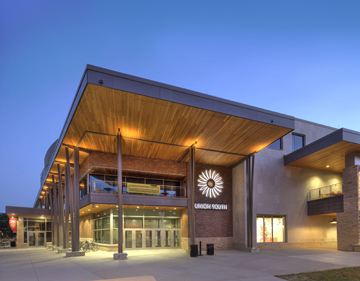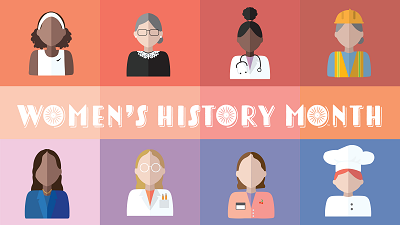Celebrating International Women’s Day with Three Outstanding Union Leaders
Within each of our departments are talented women that help make the impossible happen every day. They are superheroes that tackle everything from programming during a pandemic to planning and creating intricate landscaping projects. While we work every day to appreciate one another’s contributions and to celebrate each person’s full identity, we also keep track of days meant to deliberately and thoughtfully celebrate people. One of those days is March 8, which is globally recognized as International Women’s Day, when we celebrate all that women have achieved, and reflect on what is yet to be accomplished. March is also Women’s History Month in which we are encouraged to take time to acknowledge and honor the contributions of women throughout America’s history.
Here at the Wisconsin Union, we’re so incredibly proud of all of the talented women who help create unforgettable experiences for our members every day. To celebrate International Women’s Day and Women’s History Month, we interviewed three female leaders within the Union—Deputy Director Susan Dibbell, Catering Director Lisa Wadzinske, and Associate Director for Social Education Heidi Lang—and asked them to share their experiences as female leaders.
How long have you been with the Union?
Lisa: 23 years
Susan: 33 years
Heidi: 18 years
What position did you start in?
Lisa: I started as a student catering employee with Memorial Union.
Susan: I started as the Union South program director
Heidi: I started in the position of education program coordinator, which is now the director of education and arts programs position.
Are you doing what you thought you would be doing while you were earning your bachelor’s degree?
Lisa: I graduated from UW-Madison with a degree in secondary education and biology. I thought that I would teach in a middle school or high school at the time.
Susan: Sort of. My undergraduate degree is in secondary education. I was active in the Union since my freshman year in college. It was from my work and volunteer leadership experiences at the Wisconsin Union that I decided to pursue a career in college union. So after I graduated, I specifically looked for a job working in a college union.
Heidi: I am doing mostly the work I thought I would be. Towards the end of my undergraduate degree, I knew I wanted to work in student affairs. I’ve always been professionally involved in student affairs in some way, including working in university housing and residence life. The education coordinator job I found initially at the Wisconsin Union was everything I loved about working in university housing, including focuses on programming, leadership development, and community-building.
What are your professional goals for the next 10 years?
Lisa: I think the effects of the pandemic will be with us for a few years, and a professional goal is to work on how this has changed the events and dining world and to adapt to what consumers will be looking for.
Susan: I am really happy in my current role at Wisconsin Union and want to continue. Higher education is changing and our role as community builders is as well. I want to be a part of the change and transformation.
Heidi: I just finished my doctorate degree last March. That was a big accomplishment and goal that I had. I’d like to be doing a little bit of teaching while continuing to work at the Union. I would like to teach courses focused on student affairs within higher education. I’d also like to do some writing around student development and a sense of belonging, emphasizing the work we do in college unions.
What is the most gratifying part of your role?
Lisa: Working with our students and watching them learn throughout their time with the Union and the University. The out-of-classroom experience that we provide for students is the most gratifying.
Susan: The Wisconsin Union is a very nimble organization–we adapt and respond, as needed. It is satisfying knowing that we do make a difference on campus.
Heidi: The most gratifying part of my job is seeing the growth and development of students as a result of their involvement with the Wisconsin Union. It’s meaningful to me to see students connect with one another; find the things that they’re excited about; find their voices; and tackle really big, complex problems while they’re developing programs and bringing ideas to life as well as thinking about how they engage other students in the programming process.
What is your favorite memory of your time working at the Union?
Lisa: I have two: meeting James Earl Jones on the Tripp Deck when he was here for an event and the opening of Union South.

Susan: There are so many—33 years of memories, and I’ve had a variety of roles within our organization. What I enjoy most is having former student leaders and employees return to campus to see us. I love reconnecting with them and hearing how UW-Madison and the Wisconsin Union impacted their life.
Heidi: I have 18 years of memories, but I think what I’ll remember most are those moments our guests often don’t see, like how during an event I was quickly mixing waffle batter that was like that scene from “I Love Lucy” in the chocolate factory, the time our team spent building 5-foot, cardboard gingerbread houses for a Terrace event, teaching staff how to create a balloon arch, and stuffing envelopes and bags while listening to our staff and leaders laughing and talking. Those are the moments I’ll always remember.
What are some professional obstacles you’ve faced and how did you overcome them?
Lisa: The lack of staffing has been a large professional challenge for many years, prior to the pandemic. We have a great team that works hard to make our events successful even during this challenge.
Susan: Frankly, the obstacles have been primarily with me and my own insecurities. The Union and UW-Madison is a very supportive environment. Luckily, I have great mentors who encouraged me to take on new duties and to try new things. Having advanced degrees was important, and the Union has been supportive of me pursuing my graduate degree. For me, it was having faith in myself, doing my homework, being prepared and going for it!
Heidi: An obstacle I’ve learned to navigate is raising children while working in an environment in which there’s always something going on. There’s always something that needs your attention at work and at home. I’ve come to the conclusion that finding a work-life balance doesn’t exist, that it’s an illusion. I think what we can do is be present, engaged and effective in the moment, wherever we are in that moment, and do the best work we can in that moment.
As a person of color in an organization that is predominantly white, I am continually trying to build relationships with students and staff, who don’t always have the same experiences or priorities while also trying to advance the ideals of diversity, inclusion and social justice. I sometimes have to figure out how to challenge in a way that isn’t interpreted as being personal and that keeps the conversation moving forward.
When I first started working at the Union, I was on every diversity committee and project, and I was there because I wanted to be there. But I had a realization that if I was in that space, it meant that someone else wasn’t. And so I began to consider how to create a commitment to diversity and inclusion within an organization that’s not reliant on one single person. There are times I’ve stepped up when needed, and there are times I’ve deliberately stepped back to make room for other people. I think that has helped grow capacity within our organization, so our organization’s diversity efforts weren’t built on a shaky foundation that solely relies on one person, particularly a person of color, who’s on all of the diversity committees and pushing those ideas forward. And I was that person for a while, but I think sharing that has been healthier for me, and it’s served the organization well to build the opportunity for people to really become allies and to understand and realize that they have a stake in that as much as I do as a person of color.
Who do you go to for support when you need it?
Lisa: For support, my boss or other colleagues. On a personal level, I have a great group of friends.
Susan: I’ve had a lot of great mentors in my life. I continue to go to them for personal and professional advice.
Heidi: I have a really good group of friends that I depend on and trust. When I am struggling, I rely on them for distraction, reframing, and just to listen. It is an affirming group of women that will be honest and always have a new perspective for me to consider.
How have things changed as a woman in the workplace since you started your career?
Lisa: N/A
Susan: I have found the Wisconsin Union to be very supportive of women in the workplace. I have never been denied an opportunity because I am a woman. And I am currently in a position that is typically held by men. As far as I recall, we’ve always had women in leadership at the Union.
Heidi: I feel there’s an increasing degree of flexibility over the years. I think we’ve seen that during COVID-19, too. But, over the years, there’s been increasing flexibility to bring more of yourself and understanding about when you have challenges. Those challenges are more accepted and, if not accepted, at least not looked down upon. And I think there’s more conscious effort to create more space for women, their voices and their perspectives, because I think there’s more awareness in society of the tendency for men to dominate those spaces.
I think, especially at a college campus and particularly at the Wisconsin Union, I think there are efforts to ensure that folks have an opportunity to weigh in at some point in the process. That’s a hard question, because, for me, the reason I’ve stayed with the Union for almost 20 years, is because, to me, it’s always been an organization that was invested in their employees. I always felt that, even when there were challenges or things weren’t going well in the day, it was a place that wanted me to be successful in all of my complexity. So, I don’t know that that’s changed at the Union. I feel like I lucked into working at the Wisconsin Union. That’s acknowledging it’s not perfect. But, when I think about other people I know and what their workplaces are like, I feel very fortunate to be able to call the Wisconsin Union my home for almost 20 years.
What professional advice would you give to other women?
Lisa: Have confidence in who you are and know that your voice can make a difference.
Susan: Don’t be afraid to try new things, believe in yourself and have great mentors.
Heidi: Keep learning. Be open and have an attitude of “yes.” Cultivate the attitude of “sure, let’s try it” or “I can do that.”
Thank you to Lisa, Susan Heidi, and all of the women who continue to help the Wisconsin Union provide experiences of a lifetime.
Note: Some responses have been edited for length and clarity.


